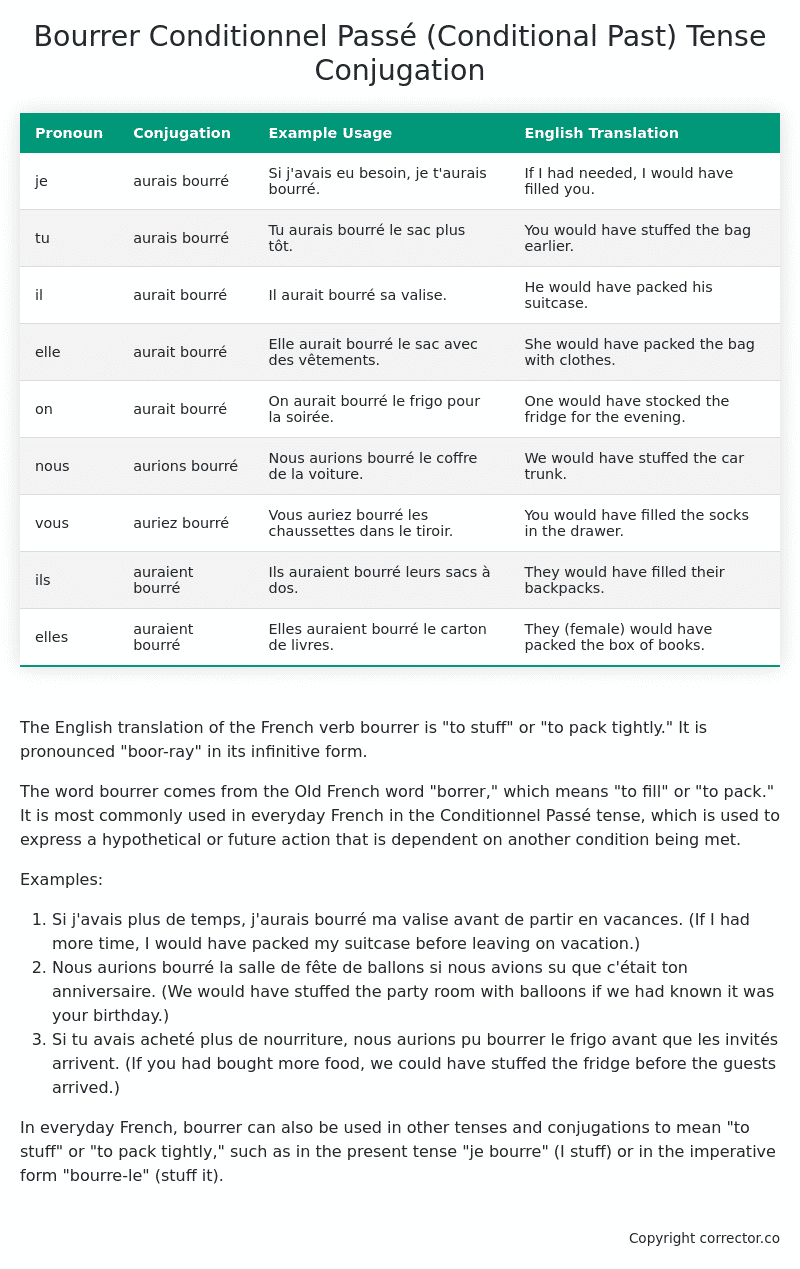Conditionnel Passé (Conditional Past) Tense Conjugation of the French Verb bourrer
Introduction to the verb bourrer
The English translation of the French verb bourrer is “to stuff” or “to pack tightly.” It is pronounced “boor-ray” in its infinitive form.
The word bourrer comes from the Old French word “borrer,” which means “to fill” or “to pack.” It is most commonly used in everyday French in the Conditionnel Passé tense, which is used to express a hypothetical or future action that is dependent on another condition being met.
Examples:
- Si j’avais plus de temps, j’aurais bourré ma valise avant de partir en vacances. (If I had more time, I would have packed my suitcase before leaving on vacation.)
- Nous aurions bourré la salle de fête de ballons si nous avions su que c’était ton anniversaire. (We would have stuffed the party room with balloons if we had known it was your birthday.)
- Si tu avais acheté plus de nourriture, nous aurions pu bourrer le frigo avant que les invités arrivent. (If you had bought more food, we could have stuffed the fridge before the guests arrived.)
In everyday French, bourrer can also be used in other tenses and conjugations to mean “to stuff” or “to pack tightly,” such as in the present tense “je bourre” (I stuff) or in the imperative form “bourre-le” (stuff it).
Table of the Conditionnel Passé (Conditional Past) Tense Conjugation of bourrer
| Pronoun | Conjugation | Example Usage | English Translation |
|---|---|---|---|
| je | aurais bourré | Si j’avais eu besoin, je t’aurais bourré. | If I had needed, I would have filled you. |
| tu | aurais bourré | Tu aurais bourré le sac plus tôt. | You would have stuffed the bag earlier. |
| il | aurait bourré | Il aurait bourré sa valise. | He would have packed his suitcase. |
| elle | aurait bourré | Elle aurait bourré le sac avec des vêtements. | She would have packed the bag with clothes. |
| on | aurait bourré | On aurait bourré le frigo pour la soirée. | One would have stocked the fridge for the evening. |
| nous | aurions bourré | Nous aurions bourré le coffre de la voiture. | We would have stuffed the car trunk. |
| vous | auriez bourré | Vous auriez bourré les chaussettes dans le tiroir. | You would have filled the socks in the drawer. |
| ils | auraient bourré | Ils auraient bourré leurs sacs à dos. | They would have filled their backpacks. |
| elles | auraient bourré | Elles auraient bourré le carton de livres. | They (female) would have packed the box of books. |
Other Conjugations for Bourrer.
Le Present (Present Tense) Conjugation of the French Verb bourrer
Imparfait (Imperfect) Tense Conjugation of the French Verb bourrer
Passé Simple (Simple Past) Tense Conjugation of the French Verb bourrer
Passé Composé (Present Perfect) Tense Conjugation of the French Verb bourrer
Futur Simple (Simple Future) Tense Conjugation of the French Verb bourrer
Futur Proche (Near Future) Tense Conjugation of the French Verb bourrer
Plus-que-parfait (Pluperfect) Tense Conjugation of the French Verb bourrer
Passé Antérieur (Past Anterior) Tense Conjugation of the French Verb bourrer
Futur Antérieur (Future Anterior) Tense Conjugation of the French Verb bourrer
Subjonctif Présent (Subjunctive Present) Tense Conjugation of the French Verb bourrer
Subjonctif Passé (Subjunctive Past) Tense Conjugation of the French Verb bourrer
Subjonctif Imparfait (Subjunctive Imperfect) Tense Conjugation of the French Verb bourrer
Subjonctif Plus-que-parfait (Subjunctive Pluperfect) Tense Conjugation of the French Verb bourrer
Conditionnel Présent (Conditional Present) Tense Conjugation of the French Verb bourrer
Conditionnel Passé (Conditional Past) Tense Conjugation of the French Verb bourrer (this article)
L’impératif Présent (Imperative Present) Tense Conjugation of the French Verb bourrer
L’infinitif Présent (Infinitive Present) Tense Conjugation of the French Verb bourrer
Struggling with French verbs or the language in general? Why not use our free French Grammar Checker – no registration required!
Get a FREE Download Study Sheet of this Conjugation 🔥
Simply right click the image below, click “save image” and get your free reference for the bourrer Conditionnel Passé tense conjugation!

Bourrer – About the French Conditionnel Passé (Conditional Past) Tense
Formation
Common Everyday Usage Patterns
Expressing Unreal Past Scenarios
Polite Requests or Suggestions
Expressing Doubt or Uncertainty
Interactions with Other Tenses
Conditional Present
Indicative Past Tenses
Conditional Future
Summary
Want More?
I hope you enjoyed this article on the verb bourrer. Still in a learning mood? Check out another TOTALLY random French verb conjugation!


